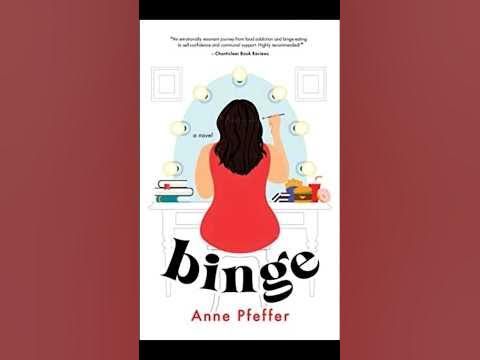
In her latest novel “Binge”, Anne Pfeffer shares a delicate yet firm message: being a beautiful woman essentially means being a good person.
“Aren’t you eating too much?” my boyfriend asked me after I had proudly declared my commitment to consuming three healthy meals a day. We’ve had “the talk” in the past. I’ve shared my fascinating eating disorder recovery journey with him: going through six hours of ballet training per day, surviving on five liters of green tea with honey, three tablespoons of cottage cheese, and an apple.
I’ve mentioned countless arguments over the family dining table, starving, bingeing, and purging. I had put my best effort into leaving the past in the past. Am I eating to excess now? This was supposed to be a joke. I wasn’t laughing. Each person has their way of dealing with trauma. Often people with eating disorders like me feel internal pressure to be skinny to be validated. Especially when compared to other “perfect” individuals considered modern role models. Somehow society had convinced us that our self-worth is measured by inches around our waists.
You don’t need to be a SATC fan to agree with Stanford Blatch. Owing to social media, judging evolved from an innocent hobby to a full-on ruthless sport in which contestants compete for The Meanest Comment award. We spend hours burnishing our image through profile photos, terrified of hearing: “You look nothing like your picture”. 28-year-old Sabrina Hunter is no exception. She is
intelligent, sassy, determined, and incredibly gifted. Working as a talent agent assistant in Los Angeles, she knows better than anyone what impact your appearance can have on your career. One day Sabrina receives a long-awaited opportunity of a lifetime. She faces crippling fear of rejection and fear of losing her chance. Not due to the lack of talent but because she isn’t “cute and marketable”. Meanwhile, the only thing standing between Sabrina and her dream is herself.
This book will answer a question each person unfamiliar with binge eating asks at least once in their lifetime: why can’t they stop? Sabrina’s weight loss process triggers unresolved issues and emotions she tries to suppress and substitute with food: annoyance, anger, defiance, anxiety due to the lack of support, and heartbreaking loneliness. She spends her evenings enjoying the company of her two best friends – Fat and Sugar. For Sabrina, overeating is a coping mechanism. Everything changes when she starts to attend local meetings for compulsive overeaters and joins the twelve-step program.
I thoroughly enjoyed watching Sabrina take control and befriend her inner saboteur. What impressed me the most was Pfeffer’s compassionate and respectful tone of voice addressing hyper-sensitive topics of mental health issues such as compulsive overeating and bulimia. Moreover, “Binge” is not your average nutrition book. It teaches young adults the fundamentals of true friendship and
partnership – mutual trust and respect. In healthy relationships, people spend time with you for no other reasons except they want your company.
Even though “Binge” is written from first-hand, real-life experience, it becomes like a fairy tale by the end. I find it fanciful and more suitable for a Christmas-themed Netflix rom-com. However, if you’re looking for an inspiring happiness booster – and believe in miracles – this book is just what you need.
This was written by our contributing writer, Daria Bahlai. You can find her on Instagram @dbahlai
Leave a Reply